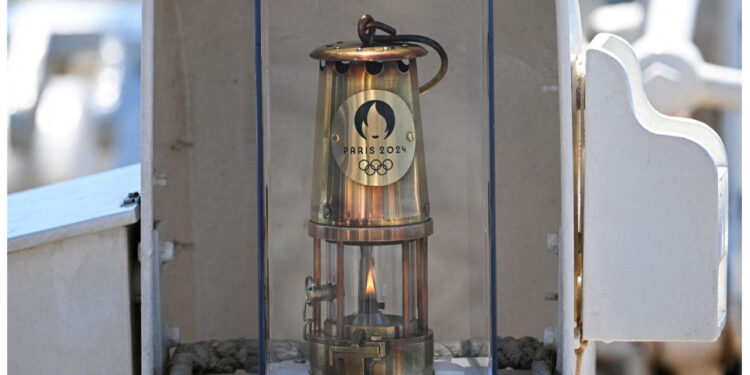Crowds began to gather early Wednesday morning outside Marseille’s Old Port as a 19th-century sailing ship bearing the Olympic torch appeared on the horizon. More than 1,000 boats accompanied the Belem, a three-masted schooner, as it neared the harbor of France’s second-largest city in a slow maritime parade on calm seas under a bright blue sky.
Florent Manaudou, a four-time French Olympic medalist and swimmer, brought the torch ashore Wednesday evening. He transferred the torch to paralympian Nantenin Keita, who then handed it on to French rap singer Jul, who is from Marseille. He grabbed it and lit the Olympic cauldron at the Old Port in front of an estimated 150,000 people.
City officials predicted that a billion more people will watch the event live on television around the world, making it the first extravaganza for fans less than three months before the 2024 Paris Summer Olympics begin on July 26.
The procession was set to feature a number of sports icons, including former NBA star Tony Parker and Ivory Coast soccer great Didier Drogba, as well as charity and entertainment celebrities. French President Emmanuel Macron was among those in Marseille who witnessed the arrival. They scheduled fireworks and free outdoor music to continue into the night.
The Belem transported the flame from Greece. Throughout the 12-day cruise, the flame was an integral element of daily life aboard the ancient vessel. The crew even brought the flame to the table during meals and closely monitored it while the storm raged outside.
The festivities continue in Marseille on Thursday, when the torch will embark on a 68-day, 7,500-mile tour across France, including both the mainland and France’s overseas territories. Around 11,000 torchbearers will carry it through 65 French territories, stopping at over 450 towns and cities, as well as other iconic and historic landmarks.
It will travel from Marseille through southern France, including a stop on the island of Corsica, before continuing to southwest France, up the west coast to Normandy, and finally to Brittany. From there, the flame will return to Guadeloupe and Martinique by water. We will deliver another torch to the remote territories of French Guiana, Réunion, and French Polynesia.
On the mainland, the Olympic torch will visit Lascaux in the southwest, where ancient murals cover cave walls; Carcassonne, a medieval fortress; Versailles Palace; Mont Saint-Michel; and the Loire Valley’s castles. It will pass through vineyards and visit various Olympic venues.
Throughout the journey, the Olympic torch relay, which began in Greece last month, will pay respect to key people who have inspired and contributed to French culture, including Joan of Arc, Charles de Gaulle, and singer Edith Piaf.
The opening ceremony on the River Seine, the first-ever Olympic curtain-raiser outside of a stadium, will conclude the relay in Paris on July 26.
“It’s something we’ve been waiting for a very long time,” main organizer Tony Estanguet said Monday, referring to the 100-year gap since Paris last hosted the Summer Games. “The games are coming home.”
France, which previously held the 1900 Games, sees itself as the center of the contemporary Olympic movement. French aristocrat Pierre de Coubertin reintroduced the idea of the Games, which the Greeks had practiced until the fourth century BC.
Wednesday’s carefully choreographed ceremony is the first test for the French organizing committee, which has faced criticism for ticket prices and disruption to venue towns, particularly Paris, where transportation and other public works have marred the landscape for the past two years.
Security is also a problem, and the Marseille event served as a preliminary test for that. The revelation that the same ISIS affiliate suspected of targeting a Moscow music hall in March also planned to attack France has placed France on high terror alert.
Approximately 6,000 law enforcement officials were on duty in Marseille when the fire arrived.
“It’s completely unprecedented for the national police to mobilize so many people on the same day and in the same place,” regional police coordinator Cedric Esson told reporters ahead of the event.
Approximately 200 members of France’s security services will accompany the torch throughout the relay. They will consist of an anti-terrorism SWAT unit and anti-drone agents.
The designers of the 2024 Olympic torch claim it is all about symbolism. It’s composed of lightweight steel for purity, and it narrows at the top and bottom in a symmetry designed to represent equality and parity.
The Olympic and Paralympic Games will use the same torch for the first time, reflecting efforts to close the gap between them.










